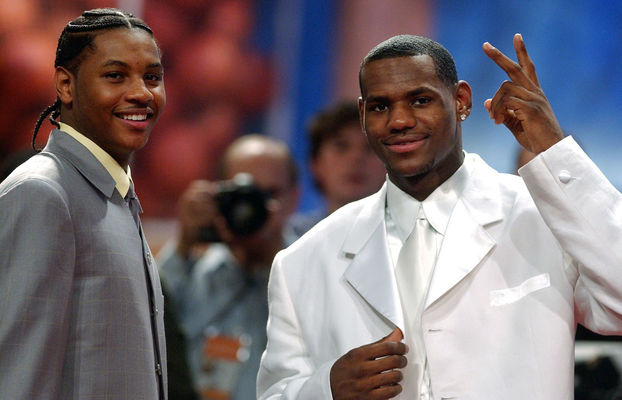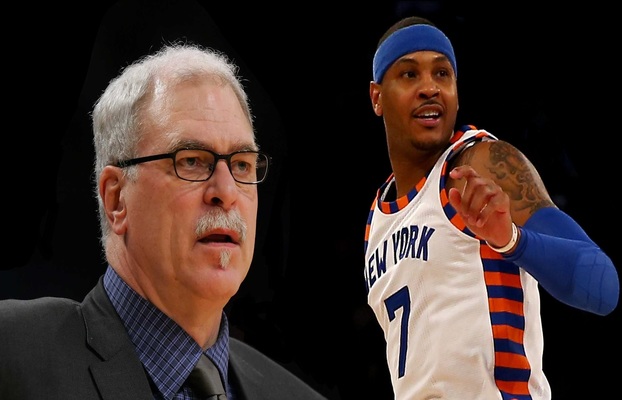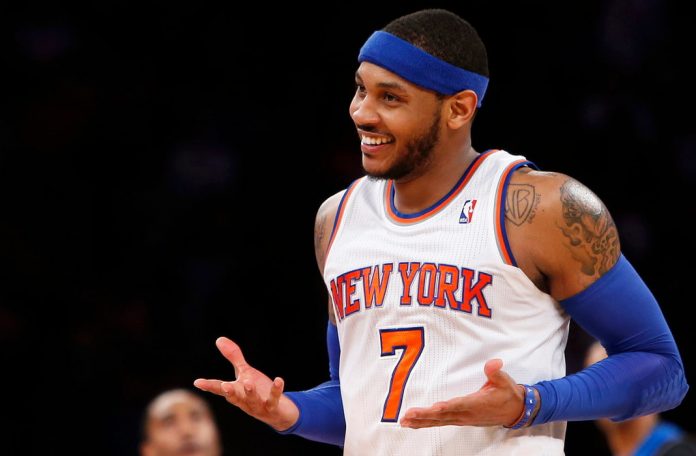The New York Post once gave advice about the #1 pick in the 2003 NBA Draft. “You will probably lose less, over the next 15 years or so if you went with Anthony.” The other player to go with was LeBron James. Once upon a time, Carmelo Anthony’s legacy was about championships and winning.
Anthony won an NCAA title his freshman season at Syracuse. Before that, he won a state high school championship. Crazy town. How could someone notorious for his failures to win also be a two-time champ?
Carmelo Anthony’s reputation wasn’t always so poor. He was once viewed as a consummate winner and model teammate. You’re probably thinking “Wait, what!? Carmelo Anthony!? Winner!?” Two phrases that haven’t been put together in a long time unless you’re including “not” in front of the “winner.” But yes, Anthony came into the league with expectations to win championships.
So, what did the world look like when Carmelo Anthony’s legacy was one of a winner? Did people still think the world was flat? Did scientists still think Pluto was a planet? Was NBA Live still better than 2K? Actually, Anthony wasn’t so rotten in the public eye until recent years. In fact, up until the 2017-18 season, Carmelo still had the support of most NBA fans.
How could a person’s reputation change so dramatically? Well, it begins with the original perception of that person.
High School
Let’s take a journey back to Carmelo’s teenage years. An era in which high school players were declaring for the NBA Draft nonstop, and Carmelo Anthony was the golden boy who chose college instead.
At Oak Hill, his team went 32-1, en route to a state championship. Anthony even hung up 34 points on rival LeBron James in one matchup. His success led many people to believe he would declare directly for the NBA Draft.
2002 was the peak of the era when high schoolers skipped college. Players like Tracy McGrady, Amar’e Stoudemire, and Jermaine O’Neal were all recent examples of the fame that could be had, not to mention Kobe Bryant and Kevin Garnett who came before them. Anthony wasn’t exactly a model student either, he had to take the ACT multiple times to achieve the minimum score for college. All these factors piled up into a scenario where Anthony skipped college.
Except Anthony chose Syracuse, shocking basketball scouts across the U.S. His decision went against a path rising in popularity and pleasantly surprised many people.
College
At Syracuse, Carmelo Anthony simply dominated. Coach Jim Boeheim even said that Anthony that year was “by far, the best player in college basketball. It wasn’t even close.”
Anthony led the team to a 30-5 record and earned Second-Team All-American by AP. Syracuse won its first NCAA title as a result, and Carmelo was named Most Outstanding Player for the tournament. He even broke the tournament’s points record by a freshman with 33 against Texas.
In total, Anthony averaged 22.2 points, 10 rebounds, and 2.2 assists at Syracuse. Everybody loved Melo. He didn’t stay four years in college, wasn’t white like Christian Laettner or Bobby Hurley, and didn’t go to a school like Duke or Kentucky.
Having achieved everything he had set out for himself, Carmelo Anthony saw few reasons to stay in college. Thus, he began his NBA journey and declared for the draft, as a national champion and darling of the press.
NBA Draft
Let’s start again.
The New York Post once gave advice about the #1 pick in the 2003 NBA Draft. “You will probably lose less, over the next 15 years or so if you went with Anthony”. The other player to go with was LeBron James. Heading into the NBA Draft, people seriously believed Anthony would win more.
And, why shouldn’t they? Anthony didn’t give them any reason to doubt. He had won at every level of basketball, and some would even argue an NCAA championship is more difficult than an NBA championship.
Anthony’s NBA career began with high expectations. After all, fans legitimately thought he was in the debate for the #1 pick over LeBron James. Yet, as the years wore on, it was clear the NBA is simply a different ball game compared to high school or college.

(Paul L. Newby II/THE GRAND RAPIDS PRESS)
Denver Nuggets
Anthony was brilliant by all standards during his first few years in Denver. By his third year in the league, he was averaging 26.5 PPG. He continued his narrative as a winner, making the playoffs in his rookie season. Not even LeBron James could say the same, who didn’t make the postseason until his third year.
Looking back on his Denver years, however, hindsight reveals that Anthony never found much success in the playoffs. Although he made the postseason for nine straight years, he only made it out of the first round once.
He was never heavily scrutinized by the press for this, however. Maybe it was the smaller market in Denver or perhaps sympathy for his situation in a cutthroat Western Conference.
New York
I guess we should’ve wondered if he was really all about winning after his departure from Denver to New York. Although there was the temptation of playing in his birth state (he moved to Baltimore when he was young so should this even count as a reason?) with Amar’e Stoudemire, it’s clear now that wasn’t the real motive.
Simply put, Carmelo wanted a bigger market to expand his brand and pull in more dollars. Now, that’s not too shameful. Who wouldn’t rather be in New York than Denver?
The Nuggets were actually better than the Knicks, and the roster fit him well. Anthony had shooters like J.R. Smith, Ty Lawson, Chauncey Billups, and Arron Afflalo playing with him, and a veteran backcourt in Kenyon Martin and Chris Anderson.
Meanwhile, New York had only Stoudemire and would end up trading four of their best six players in exchange for Anthony. No offense to Stoudemire, who just had the best season of his career, but the Nuggets just had better players to match Anthony’s skill set. Anthony would continue to put up numbers and trot out a new signature shoe every season in New York, but neither helped improve his playoffs results.
Jeremy Lin gets Curved
Admittedly, Stoudemire was often injured, but even when another star-caliber player emerged Anthony pushed them out. This player would be Jeremy Lin, the man whose story captured the heart of every NBA fan during the 2012 season. Even though Lin wouldn’t stay at the levels of Linsanity, everybody wanted him to and few people predicted he wouldn’t.
Multiple teammates anonymously quoted that Anthony did not like how Coach Mike D’Antoni ran a lot of sets through Lin and got jealous of the attention Lin received. Stoudemire even openly said that not “everyone wasn’t a fan of [Lin] being the new star.”
Lin was everything the Knicks needed, a dynamic distributor and slasher with terrific instincts for the pick-and-roll. Except when the Rockets offered him a three-year $25 million deal, Anthony called it “ridiculous.” Even though the Knicks previously stated they would “match any offer on Lin up to a billion dollars,” they coincidentally passed after Anthony’s take on it.
Jeremy Lin would not pan out into the type of player the contract penned him for, but that’s not the point. The Knicks had a chance to add what most people thought was a star-level player to the roster but didn’t. Former Knicks have all but outright said that Carmelo’s hunger for the spotlight was the reason. We don’t know if it was entirely true or not, but it definitely played a factor, and NBA fans certainly didn’t judge him any better for it.
Carmelo Gets Paid
2012-13 would be the last time Carmelo Anthony would make the second round of the playoffs. And note, it was only the second time in his career. Anthony put up a valiant 28.5 PPG against the Pacers but fell in six.
After that, the Knicks/Anthony ride would completely derail. The Knicks missed the playoffs in 2014, and Phil Jackson handed him five years and $120 million, plus a no-trade clause that would haunt the Knicks in a few years.
Given an opportunity to join the exciting and promising Chicago Bulls, Anthony instead stayed with New York. While Carmelo cites loyalty, many NBA fans point to the extra $50 million the Knicks offered. Chicago was clearly a better fit for Anthony, a defensive team to cover his weakness that needed a scorer. Just that season, they were a 48-win team that succeeded despite having few offensive options.
The Knicks’ two best players behind Anthony — Bargnani and Stoudemire — played a combined 65 games that season. Fans will never know if it was loyalty or money that kept Anthony in New York. What isn’t questionable is that the move might not have been the wisest for both Carmelo or the Knicks.

The Zen Master v.s. Carmelo Anthony
Then came the Phil Jackson saga. This series of events is as bizarre as it gets in the basketball world. There’s a simple formula for what happened. Phil Jackson = good coach. Phil Jackson ≠ good GM.
Basically, the only good move Phil Jackson made during his tenure was drafting Kristaps Porzingis. He gutted the roster of quality wings by dealing Iman Shumpert and J.R. Smith for a bag of potato chips. After that, he signed Robin Lopez for $54 million, traded for Derrick Rose, and signed Joakim Noah to his infamous $72 million deal. Oh, and he also tried to run the triangle offense in 2017. And no, the Knicks weren’t the super team Derrick Rose said they were (as if the Knicks weren’t being made fun of enough).
Then came Jackson’s constant criticism of Anthony, including his comments that Anthony “might be better off somewhere else.” Ironic how Phil Jackson failed to realize that he too, “might be better off somewhere else.”
Anthony was the consummate professional, respectful at all times and just wanted to play basketball. Jackson’s comments rallied many people who disliked Anthony before to his side, who didn’t approve of that sort of treatment from the front office.
There were still doubters of Anthony, who thought he was a ball-stopper. He gave too little effort on defense and didn’t move the ball enough. All this was true and some people overlooked those facts in their overwhelming contempt for Phil Jackson.
Under Jackson and Carmelo, the Knicks missed the playoffs four straight years. By then, Carmelo was 32, and it was clear it was time to go. After months of Phil Jackson trying to find a deal Anthony liked (remember that no-trade clause?), the two malcontents’ headbutting led to both of them leaving the organization, Anthony traded to Oklahoma City and Phil Jackson “stepping down” (fired).
And, then there’s the whole Olympic Melo spiel. The version of Carmelo that was happy to spot up on the perimeter. That was the Carmelo Anthony fans hoped Oklahoma City was getting. After all, he did play in four Olympics, and if he co-existed with all the stars on those teams, why not with Russell Westbrook and Paul George? Alas, a few weeks of basketball against subpar competition is not quite the same as the NBA.
Carmelo Anthony’s Legacy
We know what happens next. Carmelo Anthony goes from respected veteran finally earning his chance at contention to egotistical old head who nobody likes. What happened to the aging star who just wanted to win a championship? Who’s this overpaid snob too vain to come off the bench?
The truth of the matter is, Anthony probably had that ego in him all along. He cared too much about his reputation, and in the end, that desire to maintain his legacy is what ruined it. More irony can be found in the fact that Denver’s relative low-keyness protected Anthony from the media, and it was his own desire to be in New York that exposed him to their brutality.
Anthony feared coming off the bench would lessen him in the eyes of his peers, but in fact, it was his refusal to do so that did him in. Carmelo Anthony went from the guy who won championships at every level, to someone viewed as selfish and money-hungry. Perhaps his personality changed as he developed. Maybe he had been the same person the whole time. All that can be certain is that Carmelo Anthony’s legacy has changed dramatically over the years, and probably rightfully so.

